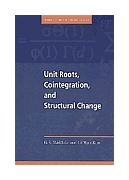Unit Roots, Cointegration,
and Structural Change
Time series analysis has
undergone many changes in recent years with the advent of unit roots and cointegration.
Maddala and Kim present a comprehensive review of these important developments and examine
structural change. The volume provides an analysis of unit root tests, problems with unit
root testing, estimation of cointegration systems, cointegration tests, and econometric
estimation with integrated regressors. The authors also present the Bayesian approach to
these problems and bootstrap methods for small-sample inference. The chapters on
structural change discuss the problems of unit root tests and cointegration under
structural change, outliers and robust methods, the Markov-switching model and Harvey's
structural time series model. Unit Roots, Cointegration and Structural Change is
a major contribution to Themes in Modern Econometrics, of interest both to
specialists and graduate and upper-undergraduate students.
G. S. Maddala is University
Eminent Scholar at the Ohio State University and one of the most distinguished
econometricians writing today. His many acclaimed publications include Limited
Dependent and Qualitative Variables in Econometrics (Cambridge, 1983) and Econometrics
(McGraw-Hill, 1977) and Introduction to Econometrics (Macmillan, 1988, 1992).
In-Moo Kim is Professor of Economics at Sung Kyun Kwan University, Seoul, Korea.
Contents
Part I. Introduction and
Basic Concepts
1. Introduction
2. Basic concepts
2.1 Stochastic processes
2.2 Some commonly used stationary models
2.2.1 Purely random process
2.2.2 Moving-average (MA) processes
2.2.3 Autoregressive (AR) processes
2.2.4 Autoregressive moving-average (ARMA) processes
2.3 Box-Jenkins methods
2.4 Integrated variables and cointegration
2.5 Spurious regression
2.6 Deterministic trend and stochastic trend
2.7 Detrending methods
2.8 VAR, ECM and ADL
2.9 Unit root tests
2.10 Cointegration tests and ECM
2.11 Summary
Part II. Unit Roots and Cointegration
3. Unit roots
3.1. Introduction
3.2 Unit roots and Wiener processes
3.2.1 Wiener processes: some definitions
3.2.2 Some basic results on Wiener processes
3.2.3 Relationships with normal distributions
3.2.4 Scaling factors in asymptotic distributions
3.3 Unit root tests without a deterministic trend
3.3.1 Some historical notes
3.3.2 The Dickey-Fuller distribution
3.3.3 Computation of critical values
3.4 DF test with a linear deterministic trend
3.4.1 Models with drift
3.4.2 Models with linear trend
3.4.3 An illustrative example
3.5 Specification of deterministic trends
3.6 Unit root tests for a wide class of errors
3.6.1 Changing the estimating equations: the ADF test
3.6.2 Choice of lag-length in the ADF test
3.6.3 Modifications of the test statistic: Phillips-Peron test
3.6.4 A comparison of the two approaches
3.7 Sargan-Bhargava and Bhargava tests
3.8 Variance ratio tests
3.9 Tests for TSP vs. DSP
3.10 Forecasting from trend stationary vs. difference stationary time series
3.11 Summary and conclusions
4. Issues in unit root testing
4.1 Introduction
4.2 Size distortions and lower power of unit root tests
4.3 Solutions to the problems of size and power
4.3.1 LR tests in ARMA models
4.3.2 IV tests in ARMA models
4.3.3 Other IV based tests - Durbin-Hausman tests
4.3.4 Modifications of the Phillips-Perron (PP) tests
4.3.5 Forward and reverse Dickey-Fuller regressions
4.3.6 Weighted symmetric estimators
4.3.7 DF-GLS test
4.4 Problems of over-differencing: MA roots
4.5 Tests with stationarity as null
4.5.1 KPSS tests
4.5.2 Leybourne and McCabe test
4.5.3 Some other tests
4.5.4 Some general comments
4.6 Confirmatory analysis
4.7 Frequency of observations and power of unit root tests
523 pages, 21 tables, 8
graphs
Księgarnia nie działa. Nie odpowiadamy na pytania i nie realizujemy zamówien. Do odwolania !.


